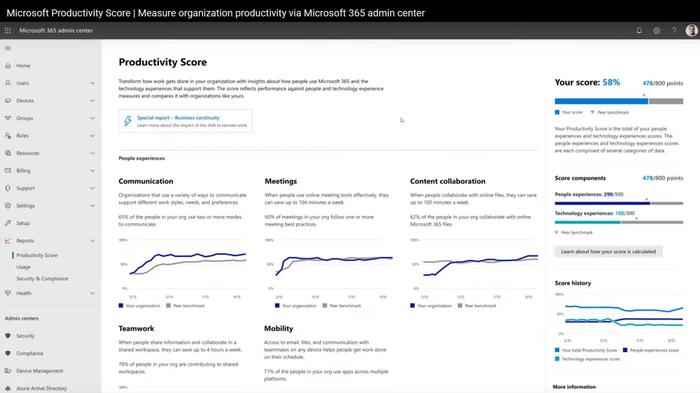In a blog post a month ago Microsoft talked about the roll out of a new feature in Microsoft 365. Microsoft Productivity Score would provide insights to "power your digital transformation," gushed the blog. The tool would present managers with data on worker content collaboration, meetings, communication, teamwork, and mobility - it was explained - as well as tracking endpoints, networking, and use of Microsoft 365 apps. With these insights from Microsoft Productivity Score managers would be able to recognise and address issues in their workforce but, importantly, Microsoft 365 CVP, Jared Spataro, firmly stated that "Productivity Score is not a work monitoring tool".
Perhaps Spataro protesteth too much? As the Microsoft Productivity Score feature has been with us for a little over a month now, managers will have started poring over their first 28-day aggregate reports concerning the productivity of the workers they supervise. WFH has perhaps made it more difficult for managers to understand what is happening across the organisation so some will be keen to check out the data.
Microsoft provides tools to anonymize user data, or even remove it, but this isn't the default option. The Guardian reports that "by default, reports also let managers drill down into data on individual employees, to find those who participate less in group chat conversations, send fewer emails, or fail to collaborate in shared documents". This sounds a bit like work monitoring.
Probably one of the strongest voices of protest in the Guardian coverage came from David Heinemeier Hansson, creator or Ruby on Rails and co-founder of the office productivity suite Basecamp. "The word dystopian is not nearly strong enough to describe the fresh hellhole Microsoft just opened up," Tweeted Hansson. "Just as the reputation of a new and better company was being built, they detonate it with the most invasive work-place surveillance scheme yet to hit mainstream."
Additionally, Dr Claudia Pagliari, a researcher into digital health and society at the University of Edinburgh, had forewarned The Guardian on the ramp up of digital surveillance due to WFH during the pandemic.
In a response by Microsoft, it was claimed that Microsoft Productivity Score is "an opt-in experience". It went on to say that the user-level data was useful in some cases "so that an IT admin can provide technical support and guidance," for example.














